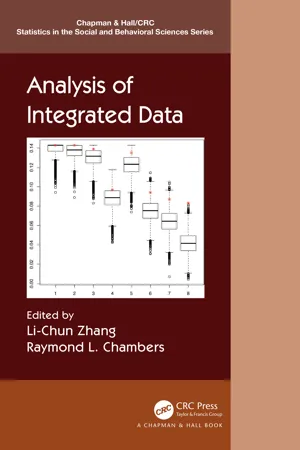
- 256 pages
- English
- ePUB (mobile friendly)
- Available on iOS & Android
Analysis of Integrated Data
About this book
The advent of "Big Data" has brought with it a rapid diversification of data sources, requiring analysis that accounts for the fact that these data have often been generated and recorded for different reasons. Data integration involves combining data residing in different sources to enable statistical inference, or to generate new statistical data for purposes that cannot be served by each source on its own. This can yield significant gains for scientific as well as commercial investigations.
However, valid analysis of such data should allow for the additional uncertainty due to entity ambiguity, whenever it is not possible to state with certainty that the integrated source is the target population of interest. Analysis of Integrated Data aims to provide a solid theoretical basis for this statistical analysis in three generic settings of entity ambiguity: statistical analysis of linked datasets that may contain linkage errors; datasets created by a data fusion process, where joint statistical information is simulated using the information in marginal data from non-overlapping sources; and estimation of target population size when target units are either partially or erroneously covered in each source.
- Covers a range of topics under an overarching perspective of data integration.
- Focuses on statistical uncertainty and inference issues arising from entity ambiguity.
- Features state of the art methods for analysis of integrated data.
- Identifies the important themes that will define future research and teaching in the statistical analysis of integrated data.
Analysis of Integrated Data is aimed primarily at researchers and methodologists interested in statistical methods for data from multiple sources, with a focus on data analysts in the social sciences, and in the public and private sectors.
Tools to learn more effectively

Saving Books

Keyword Search

Annotating Text

Listen to it instead
Information
Table of contents
- Cover
- Half Title
- Series Page
- Title Page
- Copyright Page
- Dedication
- Contents
- Preface
- Contributors
- 1. Introduction
- 2. On secondary analysis of datasets that cannot be linked without errors
- 3. Capture-recapture methods in the presence of linkage errors
- 4. An overview on uncertainty and estimation in statistical matching
- 5. Auxiliary variable selection in a statistical matching problem
- 6. Minimal inference from incomplete 2 × 2-tables
- 7. Dual- and multiple-system estimation with fully and partially observed covariates
- 8. Estimating population size in multiple record systems with uncertainty of state identification
- 9. Log-linear models of erroneous list data
- 10. Sampling design and analysis using geo-referenced data
- Index
Frequently asked questions
- Essential is ideal for learners and professionals who enjoy exploring a wide range of subjects. Access the Essential Library with 800,000+ trusted titles and best-sellers across business, personal growth, and the humanities. Includes unlimited reading time and Standard Read Aloud voice.
- Complete: Perfect for advanced learners and researchers needing full, unrestricted access. Unlock 1.4M+ books across hundreds of subjects, including academic and specialized titles. The Complete Plan also includes advanced features like Premium Read Aloud and Research Assistant.
Please note we cannot support devices running on iOS 13 and Android 7 or earlier. Learn more about using the app